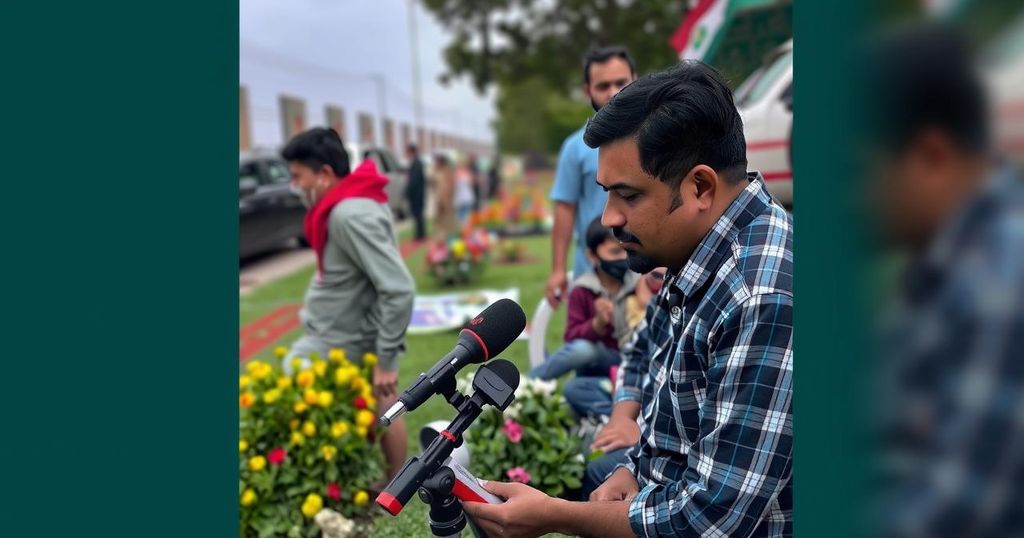The family of Mohammad Nizam, a Bangladeshi worker slain in an Israeli airstrike in Lebanon, has called for an end to the violence, holding Israel accountable for his death. The ongoing conflict has claimed nearly 3,000 lives and left over 13,300 injured, with foreign workers increasingly at risk. Nizam’s family mourns their loss, reflecting on his plans for the future and highlighting the broader humanitarian crisis affecting civilians in Lebanon.
The family of Mohammad Nizam, a Bangladeshi worker killed in an Israeli airstrike in Lebanon, has expressed deep grief and attributed sole responsibility for his death to the Israeli government. The incident occurred on Saturday as the 31-year-old was on his way to work when he stopped at a coffee shop in Beirut. With an estimated 70,000 to 100,000 Bangladeshis residing in Lebanon, many of whom are employed in labor and domestic services, the tragedy underscores the peril faced by foreign workers amidst the ongoing conflict. Nizam’s elder brother, Mohammad Jalal, lamented, “Israel is solely responsible for the death of my brother. This war should be stopped without any delay.” Jalal had been anxiously concerned for Nizam’s safety since the escalation of violence in the region but could never have anticipated such a tragic outcome to his brother’s life. “If I could have sensed this outcome even a little bit, I would have brought him back at any cost,” he stated. According to the Lebanese Health Ministry, the death toll from Israeli attacks has escalated to nearly 3,000, with over 13,300 individuals injured, predominantly civilians, due to the air and ground assaults that have severely impacted medical facilities and infrastructure. Jalal further articulated his dismay at the ongoing violence, asserting, “I don’t understand how many innocent lives need to be sacrificed to satisfy the whims of the Israeli leadership. It’s simply inhuman, insane and cynical.” Following the intensification of hostilities in Lebanon, many Bangladeshi nationals have sought evacuation; approximately 1,800 individuals have registered for repatriation flights coordinated by the Bangladeshi government and the UN’s International Organization for Migration. Unfortunately, Nizam was not among those who registered for the evacuation, having not returned home in the twelve years he spent in Lebanon. Jalal shared poignant memories, stating, “The last time we talked … he was talking about building a house here in his birthplace. He was planning to return home soon by the end of this year. But now all of our dreams for a happy reunion have faded away with this sudden blow.” As the family seeks to arrange for the repatriation of Nizam’s body, officials indicated that retrieval is unfeasible under current conditions. Jalal expressed his desire to see and bury his brother, saying, “Now I am waiting to see my brother’s face for one last time and bury him in our village. But I have no idea whether it would be possible or not amid this war situation,” highlighting the raw pain and uncertainty that has enveloped his family during these tumultuous times.
The tragic death of Mohammad Nizam amidst the ongoing conflict between Israel and Lebanon reflects the dire circumstances faced by many foreign workers in war-torn regions. As violence escalates, foreign nationals, notably those from Bangladesh, have become vulnerable to the fallout from military actions. The presence of a large Bangladeshi community in Lebanon—estimated to consist of tens of thousands of laborers—emphasizes the personal impacts that geopolitical strife can have on individual lives and families far removed from the immediate conflict. This particular incident sheds light on the broader humanitarian crisis unfolding in Lebanon, where civilian safety is increasingly jeopardized by hostilities, raising pressing questions about the protection of non-combatants in such violent conflicts.
The death of Mohammad Nizam and the subsequent grief expressed by his family underscores the tragic consequences of military conflicts on civilians, particularly foreign workers in regions impacted by war. As casualties continue to rise and humanitarian concerns deepen, calls for an immediate cessation of hostilities become ever more urgent. The story of Nizam serves not only as a personal tragedy for his family but also as a poignant reminder of the myriad innocent lives affected by the ongoing conflict in the Middle East.
Original Source: www.arabnews.com






